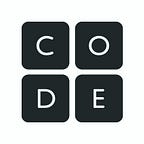Happy Pride Month! As we take time this month to celebrate the LGBTQIA+ teachers and students, we wanted to take a look back at one key historical leader in computer science.
In the early 20th century, Alan Turing defined many of the fundamental ideas of computer science. While computers in Turing’s day focused on mathematics, he could already see the possibilities unlocked by computing and he wondered about the potential for artificial intelligence. In the 1950’s he defined the test we still use today to understand computer intelligence. The Turing Test challenges a computer to a human conversation.
If you are talking to a human and a very smart computer over text (so you can’t see the computer), can you tell which is which? If you can’t tell the difference, the computer has passed the “Turing Test” for successfully imitating human intelligence. Today, the internet is filled with bots that imitate humans in short messages or on specific topics, but no computer has yet passed the Turing Test in an extended conversation that is not limited to a single subject.
Through World War II, Turing played an instrumental role in using computers to break encrypted Nazi messages. However, after the war, in 1952, Turing was convicted of being a homosexual at a time when that was illegal in Britain. As part of his punishment, he was forced to leave his work for the government in computer science.
Today, the government has retroactively exonerated Turing and other men convicted under these laws. But, we will never know what else Turing could have contributed to the field of computer science. By supporting all our students, we unlock their potential to contribute in ways we can’t envision today. One of them will use computer science to help cure a disease, another will support their local community and, perhaps, one will build the first software that passes the Turing Test.
Alan Turing was just one of many LGBTQIA+ leaders in the field of computer science. We want to thank our teachers who are working to make their classrooms inclusive for students of all sexual orientations and gender identities.
Show your support
The interest shown for the shirt our team designed and wore in the Seattle Pride Parade last year was incredibly moving. So once again, we’re making them available for purchase by anyone who wants to show their support for LGBTQIA+ individuals and equity in computer science education. Orders must be placed by Friday, June 15th and the shirts will be delivered about two weeks after that.
And, many of our team here at Code.org will be marching in the Pride Parade again this year in Seattle. Supporting our LGBTQIA+ teachers, students, and colleagues. Here’s a picture from last year:
Alice Steinglass, Code.org
